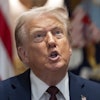DAVOS, Switzerland (AP) — The world economy will be more sluggish this year, the International Monetary Fund warned Monday, citing trade disputes that have seen China slow to its weakest pace in 30 years as well as the impact of rising U.S. interest rates.
The IMF cut its forecast for global growth this year to 3.5 percent, from the 3.7 percent it had predicted in October and down from 2018's 3.7 percent.
"After two years of solid expansion, the world economy is growing more slowly than expected and risks are rising," said IMF Managing Director Christine Lagarde as she presented the new forecasts at the World Economic Forum in Davos, Switzerland.
Underscoring the wobbly state of the global economy: China, the world's second-biggest economy, on Monday reported 2018 growth of 6.6 percent, the weakest since 1990. Consumer demand and appetite for Chinese exports weakened last year and the IMF expects China's growth to decelerate again this year — to 6.2 percent.
The fund left its prediction for U.S. growth this year unchanged at 2.5 percent — though a continuation of the partial 31-day shutdown of the federal government poses a risk. The IMF trimmed the outlook for the 19 countries that use the euro currency to 1.6 percent from 1.8 percent.
Growth in emerging-market countries is forecast to slow to 4.5 percent from 4.6 percent in 2018.
The World Bank and the Organization for Economic Cooperation and Development have also downgraded their world growth forecasts.
Britain's messy divorce from the European Union and Italy's ongoing financial struggles pose threats to growth in Europe.
And rising trade tensions pose a major risk to the wider world economy. Under President Donald Trump the United States has imposed import taxes on steel, aluminum and hundreds of Chinese products, drawing retaliation from China and other U.S. trading partners.
"Higher trade uncertainty will further dampen investment and disrupt global supply chains," said IMF chief economist Gita Gopinath.
Rising interest rates in the U.S. and elsewhere are also pinching emerging-market governments and companies that borrowed heavily when rates were ultra-low in the aftermath of the 2007-2009 Great Recession.
As the debts roll over, those borrowers have to refinance at higher rates. A rising dollar is also making things harder for emerging-market borrowers who took out loans denominated in the U.S. currency.






















